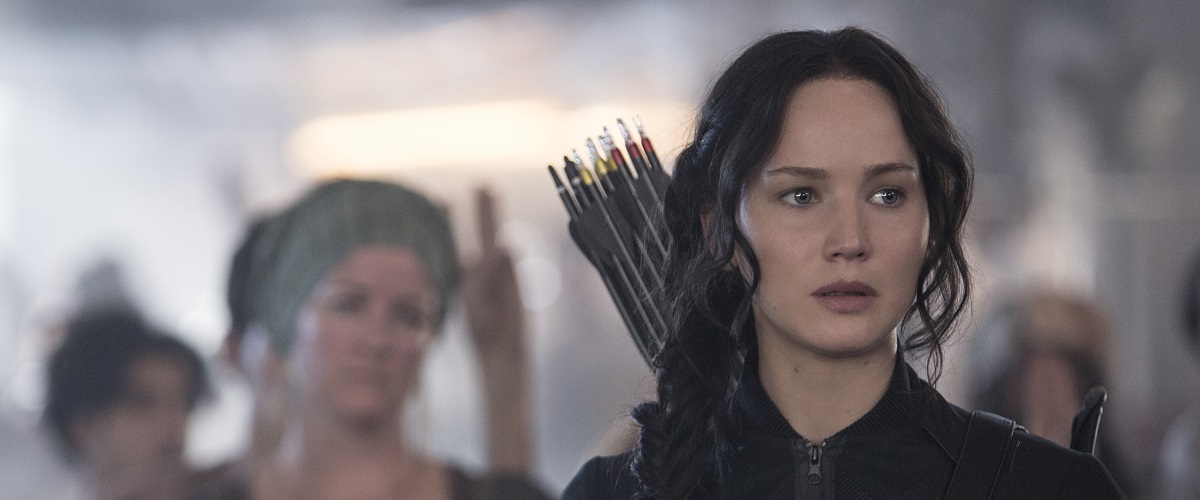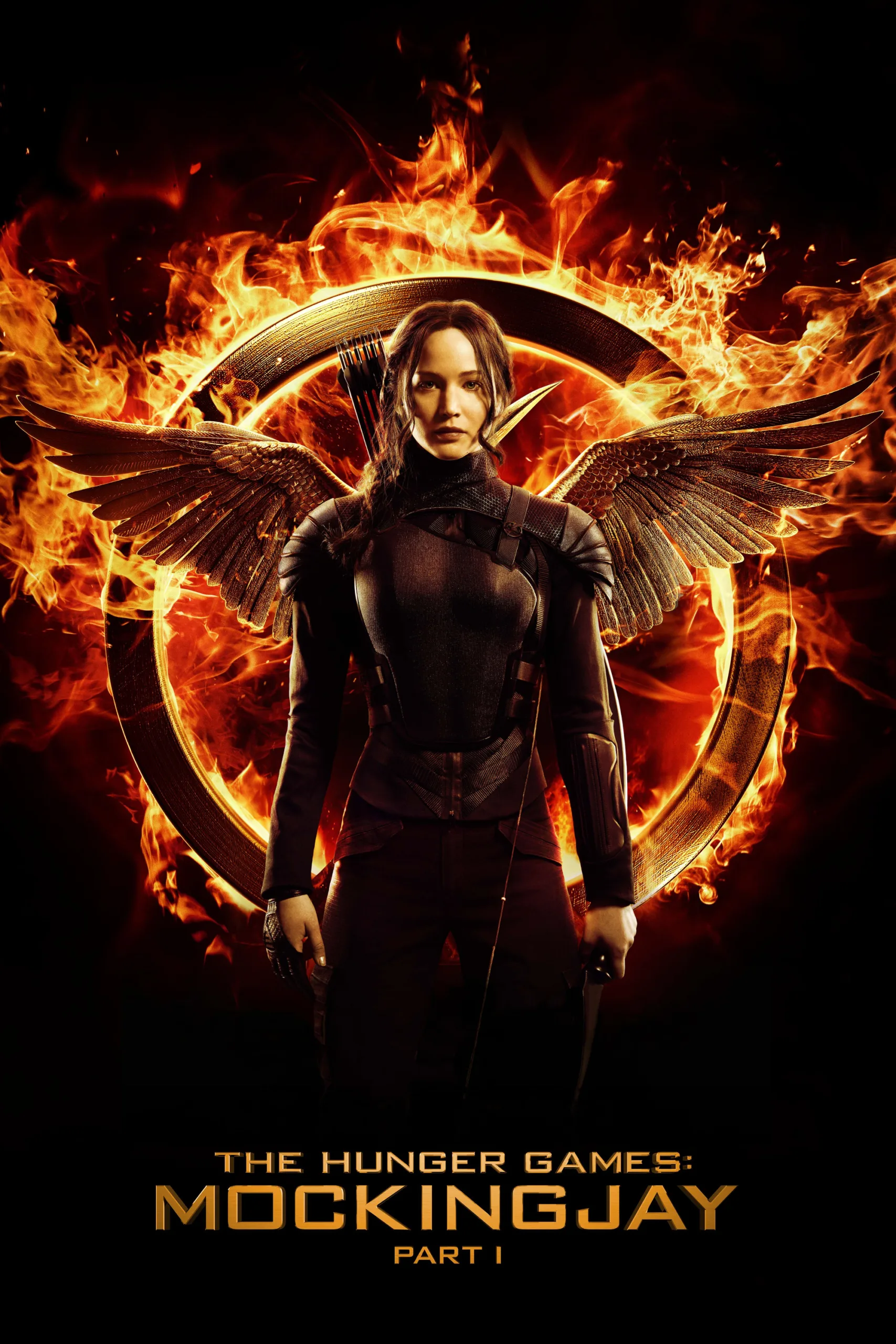Jennifer Lawrence’s charisma and the the sly excellence of her supporting cast keep “The Hunger Games: Mockingjay, Part 1” aloft. This third installment in the “Hunger Games” saga (technically chapter three, part one) is a bleak, sometimes dire experience, and not only because it’s the darkest installment yet in an already dark saga, catching dystopian rebels in a beaten-down and demoralized state. As written by regular series scribes Peter Craig and Danny Strong, and as directed by Frances Lawrence (who helmed the second film in the series, “Hunger Games: Catching Fire”), it also feels a bit stretched out, not to give the actors room to breathe and widen the film’s narrative margins to better pack them with detail, but because that’s how Hollywood increasingly does big budget “event” franchises these days: chopping one volume into two or three, a la “Harry Potter” or “The Hobbit,” to satisfy the most literal-minded readers by dramatizing as many scenes as possible, and to sell more tickets.
When the story begins, our heroes have literally been driven underground. Hunger Games champion Katniss Everdeen (Lawrence) survived multiple iterations of the books’ nationally televised, gladiator-styled, bread-and-circuses reality show, then was cynically positioned by the evil President Snow (Donald Sutherland) as a false figure of inspiration. She became the real thing thanks to her indomitable spirit, plus clever plotting by rebel fighters and image manipulators, including Katniss’s once-drunk and now sober mentor, Haymitch (Woody Harrelson); the propagandist and image consultant Plutarch (the late Philip Seymour Hoffman, to whom the film is dedicated); the tech genius Betee (Jeffrey Wright), and the image wizard (and ace comic relief) Effie Trinket (Elizabeth Banks).
“Mockingjay, Part 1” picks up where “Catching Fire” left off, with Katniss, rescued from Quarter Quell, living in a compound under the rubble of District 13 with her fellow insurrectionists. Led by their intrepid district president Coin (Julianne Moore, sporting a frosted ‘do and a severe demeanor), our heroes endure attacks by Snow’s planes and troops while plotting their next righteous move. Of course, Katniss is also supported and pined-after by her loyal right-hand, Gale Hawthorne (Liam Hemsworth), even as she frets over the fate of her great love, the still-milquetoast Peeta (Josh Hutcherson), who’s being held hostage by Snow’s forces and turned into an anti-Katniss propaganda tool, denouncing our heroine on national TV in order to legitimize his puppet masters.
If “The Hunger Games” films were to be compared structurally to “Star Wars”—still the commercial Holy Grail of film franchises—you might say that this one is the first half of “The Empire Strikes Back,” with emphasis on the visually and drastically oppressive Hoth sequences. The plot takes us from from setback to setback to setback until we feel suffocated (on purpose). Snow has the overwhelming military advantage, and in a couple of effective action scenes, we get the sense of just how long the rebels’ odds of victory are. The best of these depicts an aerial assault that’s filmed mostly from ground level, envisioning Snow’s warplanes as chunky blurs that can corner in midair, like gulls.
There’s also a mild strain of media criticism and satire, though this time out it’s less focused on the puerile distractions of televised mayhem and more interested in the construction of political images. Like the other films in the series, this “Hunger Games” sequel is good at evoking present-day, real-world phenomena while coyly refusing to commit to any specific allegory. A full-on, deliberately suicidal assault on a heavily armed government target faintly echoes images of nonviolent resistance from the Indian uprising against the British and the American Civil Rights movement, up to the point when the advancing rebels quit absorbing punishment and start dishing it out. Katniss is sold to the like-minded as a Che Guevara or young Fidel Castro (or perhaps a video-taunting Al Qaeda or ISIS-type, though of course Western audiences would rather not consider things from that angle). A good portion of the film’s first half is about Katniss being shaped and sold and even packaged by Coin and her allies as a sort of pre-fabricated deliverer, the Mickey Mouse or Mr. Clean of the revolution, then rebelling against this tendency and figuring out (with help from Plutarch) that in revolution, as in advertising, authenticity sells better than slickness.
The problem is, for all its surface intelligence, “Mockingjay, Part 1” has little depth, and that sometimes makes it much more frustrating than a more knowingly shallow and silly movie might have been. One sometimes gets the sense that the moviemakers want credit for more political daring (in a mainstream blockbuster) than they’re actually willing to earn. There are many tantalizing and even powerful allusions, such as Katniss addressing her public while standing in a cityscape bombarded by Snow’s forces, a scene that evokes pro-Palestinian camera crews showcasing collateral damage from Israeli airstrikes; but these are never developed beyond the barest wisp of a notion, and they sit quite awkwardly next to all the film’s narrative cliches and emotional shortcuts: the scene where the excessively “packaged” icon throws away the script and speaks from the heart; the scene where the powerful old bad guy is being shaved with a straight razor and gets nicked and treats the wound as a metaphor; etc.
Katniss’s participation in a chaste and (seemingly deliberately) dull love triangle with two young men of negligible charisma seems intended to build her up and ensure that no one can steal the main character’s spotlight; there’s a “turnabout is fair play” aspect to this, and at times it plays like the long delayed answer to those ’70s films driven by super-capable male characters, often played by Paul Newman or Robert Redford or Al Pacino, whose love interests were simpering bores. Katniss is such a powerful character, so strong and simple, that she wouldn’t be diminished by playing opposite more interesting romantic leads. As is, she’s like Scarlett O'Hara opposite two Ashley Wilkeses. The blandness of the film’s romantic energy might not seem so glaring if this particular installment didn’t find Katniss in a state of vulnerability, recuperating from physical and emotional damage; she’s much more passive here than in previous installments (which is true to the novel, I’m told), but it’s still frustrating to see her reduced to a bystander during the film’s action climax, watching heroic guys doing heroic things on TV monitors.
Despite all this, “Mockingjay, Part 1” is still an engrossing movie, with a wrenching ending. It’s good enough to move the story along, but no more than that. It has a good heart, exemplified by its inspiring heroine. If only it had poetry, or some sort of edge.




















